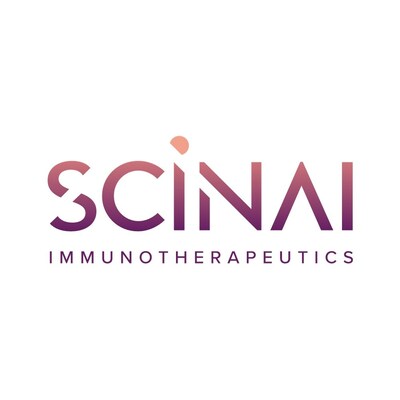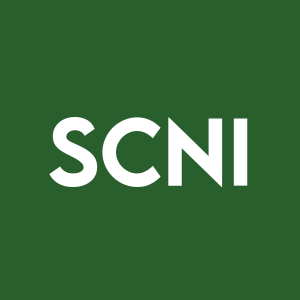Scinai Immunotherapeutics Announces Positive Regulatory Feedback from the PEI on the path for Phase 1/2a in Plaque Psoriasis with its anti-IL-17 nanoAb
Rhea-AI Summary
Scinai Immunotherapeutics (NASDAQ: SCNI) has received positive regulatory feedback from the Paul Erlich Institute (PEI) for its anti-IL-17A/F nanoAb (SCN-1) drug development program in Plaque Psoriasis. Key points include:
1. Toxicology studies can be conducted in pigs instead of non-human primates.
2. Phase 1/2a clinical trial can assess both safety and efficacy, skipping healthy volunteer testing.
3. Comparison of SCN-1 to placebo on the same human subject is approved.
4. Manufacturing process and specifications are deemed acceptable.
The Phase 1/2a study, expected to include 24 patients, is planned for the second half of 2025 with results in 2026. This feedback could lead to significant time and cost savings in Scinai's drug development plans for mild to moderate plaque psoriasis treatment.
Positive
- Positive regulatory feedback from PEI for anti-IL-17A/F nanoAb (SCN-1) drug development program
- Approval to conduct toxicology studies in pigs instead of non-human primates, potentially reducing time and costs
- Acceptance of combined Phase 1/2a clinical trial design, assessing both safety and efficacy
- Approval to compare SCN-1 to placebo on the same human subject, potentially reducing required patient numbers
- Manufacturing process and specifications deemed acceptable by PEI
- Potential time and cost savings in drug development plans
Negative
- Phase 1/2a clinical trial not expected to commence until second half of 2025, with results in 2026
News Market Reaction
On the day this news was published, SCNI gained 1.86%, reflecting a mild positive market reaction.
Data tracked by StockTitan Argus on the day of publication.
Scinai Immunotherapeutics Announces Positive Regulatory Feedback from the Paul Erlich Institute (the PEI) for its drug development program towards Phase 1/2a clinical trial of its anti-IL-17A/F nanoAb (SCN-1) in Plaque Psoriasis
- Clarified preclinical toxicology and clinical program for Plaque Psoriasis First-in-human with intralesional injections for the treatment of patients with mild to moderate Plaque Psoriasis
- The PEI had requested to see data of efficacy in blocking IL-17F; this data became available as per the Company's announcement last week describing the positive in vivo proof of concept results.
- The PEI accepted the Company's position that toxicology studies can be conducted in pigs rather than in Non-Human Primates.
- The PEI accepted the Company's position to compare the SCN-1 to placebo directly in patients with mild to moderate plaque psoriasis while skipping the need for testing in healthy volunteers, resulting in a phase 1/2a clinical trial, which will assess both safety and efficacy in the same trial.
- The PEI agreed to compare SCN-1 to placebo on the same human subject, a strategy that could significantly reduce the number of patients required for the clinical trial
- The PEI commented that the manufacturing process looks well developed and that controls and specifications presented are acceptable
- The Phase 1/2a study is expected to include approximately 24 plaque psoriasis patients and is expected to commence in the second half of 2025 with readout in 2026.

On June 4, 2024, Scinai's scientific team met, over a video conference, with representatives of the PEI for a pre-scheduled, official, Scientific Advisory meeting during which Scinai presented its drug development plan of its novel anti-IL-17A/F nanoAb for the treatment of mild to moderate plaque psoriasis and asked the PEI for guidance and advice on various aspects.
The Meeting
In the meeting, Scinai presented its Chemistry Manufacturing and Controls package, its results from non-clinical ex-vivo and in-vivo studies and its plans for toxicology and first-in-human clinical trial. In addition, Scinai presented the advantages in developing an anti-IL-17 nanoAb for local administration into the psoriatic lesions and the unmet medical need for the intended indication of patients with mild to moderate psoriasis. Scinai indicated that localized treatments to date, including corticosteroid-based creams/ointments and phototherapy require far more intense treatment regimens. These treatments require either more frequent applications (corticosteroids twice a day and biologics once a month) or more frequent visits to the clinic (phototherapy). It is expected that the biological activity of Scinai's nanoAb will last well after the treatment which would potentially result in a far less demanding treatment regimen. Moreover, as a considerable proportion of patients with mild-moderate psoriasis do not respond well to treatments that are intended for mild to moderate psoriasis (corticosteroids, phototherapy) and are treated with biological (mAbs), the unmet need appears well established.
Taken together, it was agreed by the PEI that the results of the non-clinical Proof of Concept (PoC) study (results which were announced on July 15th, 2024) and clinical explorations will shed further light on the suitability of intended localized treatment setting and regimen for Scinai's nanoAb.
Overall, the PEI commented that the manufacturing process looks well developed, that the in-process controls and the Drug Substance (DS) and Drug Product (DP) specifications are all acceptable. The PEI accepted the Company's approach that for local treatment, conducting toxicology studies in pigs rather than in Non-Human Primates is acceptable. This would translate to a significant time and cost saving for the Company. Additionally, the PEI was in agreement with the proposed design for the clinical trial and its definition as phase 1/2a trial, as it will evaluate both safety and efficacy. They supported the recruitment of mild to moderate plaque psoriasis patients (skipping the evaluation of the NanoAb in healthy volunteers) and comparing the NanoAb to placebo. Again, this will speed up the recruitment stage and lessen the cost. For correct intra-patient comparison, the PEI recommended ensuring a similar lesion size in the experimental and control groups.
Upon receiving the above guidance from the PEI, the Company expects to commence preparations for a pre-clinical toxicology study before commencing a first-in-human clinical trial of its anti-IL 17 NanoAbs for the treatment of plaque psoriasis in 2025.
The unmet market need
Today, there are about 13 million patients diagnosed with plaque psoriasis in the 7 major markets (US, EU5 and
Scinai's product candidate is designed to address the major shortcomings of currently available treatments. It is a biologic, intended to be delivered locally, intradermally, into the psoriatic lesions using a very short and almost painless needle. Scinai's product is designed to allow patients with mild to moderate psoriasis to benefit from a low frequency treatment that comes with the high specificity and potency saved for biologics but with significantly reduced risk of local side effects associated with corticosteroids or systemic side effects associated with systemic administration of biologics.
Dr. Tamar Ben-Yedidia, Scinai's Chief Scientist, noted, "It is encouraging to receive such a supportive regulatory summary for our plans. The PEI agreed with the unmet need of the patients with mild-to-moderate psoriasis for a better therapy and accepted our pre-clinical and clinical plans that will allow faster development of this product."
"I'd like to thank the PEI for their collaboration and guidance," continued Ben-Yedidia.
Scinai next intends to further fine tune dosing and drug half-life and conduct a longer duration follow on in-vivo animal study in late 2024, again, in collaboration with Prof. Gilhar of the Technion Israel Institute of Technology, complemented by a pre-clinical toxicology study before commencing a first-in-human clinical trial in late 2025.
1 Global Data Plaque Psoriasis: Global Drug Forecast and Market Analysis to 2030, November 2021
About Scinai Immunotherapeutics
Scinai Immunotherapeutics Ltd. (NASDAQ: SCNI) is a biopharmaceutical company with two complementary business units, one focused on in-house development of inflammation and immunology (I&I) biological therapeutic products beginning with an innovative, de-risked pipeline of nanosized VHH antibodies (NanoAbs) targeting diseases with large unmet medical needs, and the other a boutique CDMO providing biological drug development, analytical methods development, clinical cGMP manufacturing, and pre-clinical and clinical trial design and execution services to early stage biotech drug development programs.
Company Contacts
Investor Relations | +972 8 930 2529 | ir@scinai.com
Business Development | +972 8 930 2529 | bd@scinai.com
Website: www.scinai.com
Forward-Looking Statements
This press release contains forward-looking statements within the meaning of the Private Litigation Reform Act of 1995. Words such as "expect," "believe," "intend," "plan," "continue," "may," "will," "anticipate," and similar expressions are intended to identify forward-looking statements. All statements, other than statements of historical facts, are forward-looking statements. Examples of such statements include, but are not limited to, the timing of pre-clinical and clinical trials. These forward-looking statements reflect management's current views with respect to certain current and future events and are subject to various risks, uncertainties and assumptions that could cause the results to differ materially from those expected by the management of Scinai Immunotherapeutics Ltd. Risks and uncertainties include, but are not limited to, the risk that Scinai will not conduct a follow on in-vivo animal study in late 2024, complemented by a pre-clinical toxicology study, will not conduct an in-human clinical trial, or that such studies and trial will be delayed; that; the risk of delay in, Scinai's inability to conduct, or the unsuccessful results of, its research and development activities, including the contemplated in-vivo studies and a clinical trial; the risk that Scinai will not be successful in expanding its CDMO business or in-license other NanoAbs; the risk that Scinai may not be able to secure additional capital on attractive terms, if at all; the risk that the therapeutic and commercial potential of NanoAbs will not be met or that Scinai will not be successful in bringing the NanoAbs towards commercialization; the risk of a delay in the preclinical and clinical trials data for NanoAbs, if any; the risk that our business strategy may not be successful; the risk that the European Investment Bank (EIB) may accelerate the financial facility under its finance contract with Scinai; the risk that the Company will not execute a definitive agreement with the EIB providing for revised terms of the Finance Contract with EIB; the risk that execution of such a definitive agreement will not resolve the deficiency notice of Nasdaq with respect to the Company's shareholders' equity; the risk that the Company will otherwise be unable to regain compliance and remain compliant with the continued listing requirements of Nasdaq irrespective of any such agreement with the EIB; Scinai's ability to acquire rights to additional product opportunities; Scinai's ability to enter into collaborations on terms acceptable to Scinai or at all; timing of receipt of regulatory approval of Scinai's manufacturing facility in
Logo: https://mma.prnewswire.com/media/2310190/Scinai_Immunotherapeutics_Logo.jpg
SOURCE Scinai Immunotherapeutics Ltd.







